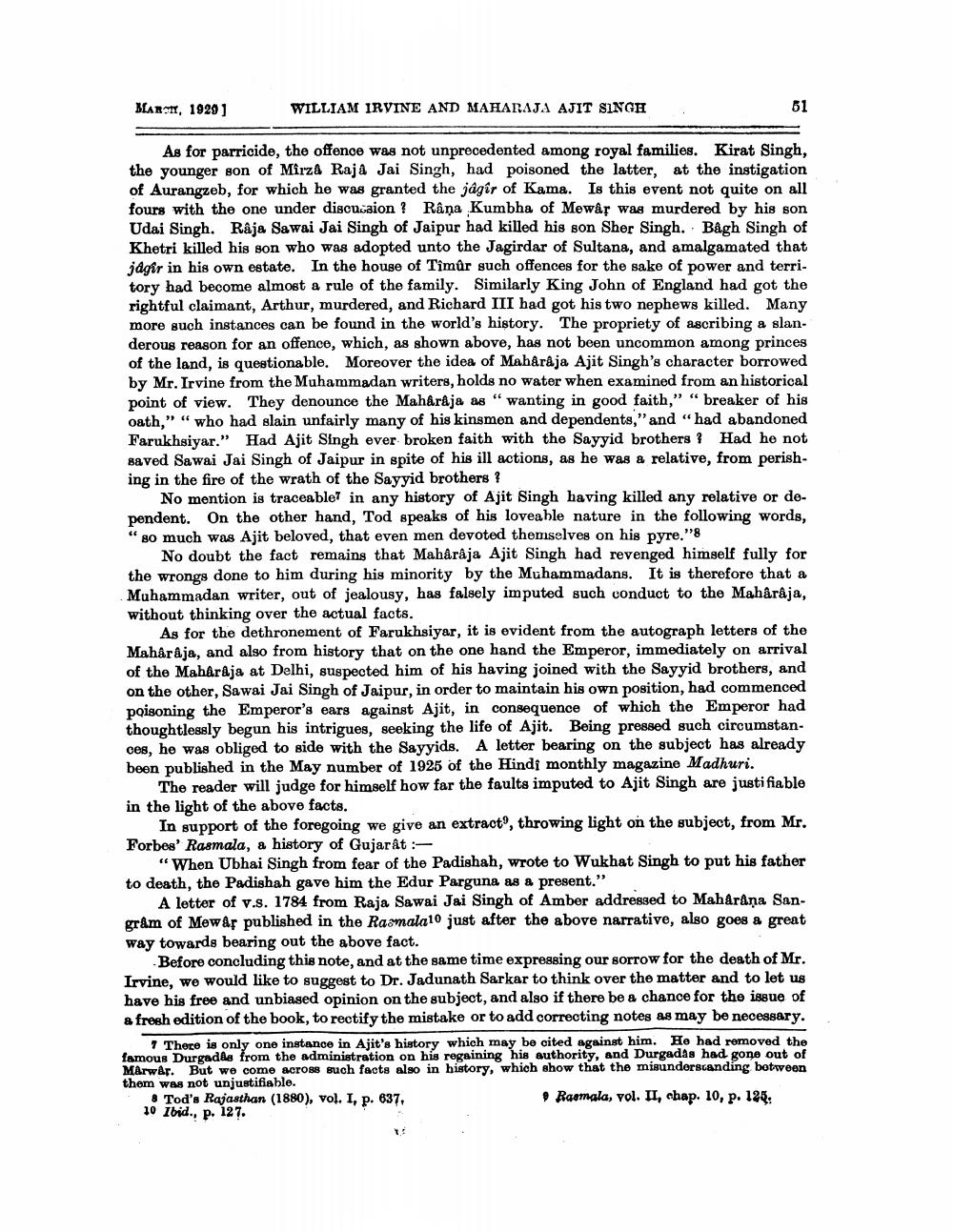________________
BARY, 1920)
WILLIAM IRVINE AND MAHARAJA AJIT SINGH
As for parricide, the offence was not unprecedented among royal families. Kirat Singh, the younger son of Mirza Raja Jai Singh, had poisoned the latter, at the instigation of Aurangzeb, for which he was granted the jágír of Kama. Is this event not quite on all fours with the one under discussion ? Râna Kumbha of Mewar was murdered by his son Udai Singh, Raja Sawai Jai Singh of Jaipur had killed his son Sher Singh. Bagh Singh of Khetri killed his son who was adopted unto the Jagirdar of Sultana, and amalgamated that jagir in his own estate. In the house of Tîmûr such offences for the sake of power and territory had become almost a rule of the family. Similarly King John of England had got the rightful claimant, Arthur, murdered, and Richard III had got his two nephews killed. Many more such instances can be found in the world's history. The propriety of ascribing a slanderous reason for an offence, which, as shown above, has not been uncommon among princes of the land, is questionable. Moreover the idea of Maharaja Ajit Singh's character borrowed by Mr. Irvine from the Muhammadan writers, holds no water when examined from an historical point of view. They denounce the Mahârâja as "wanting in good faith," "breaker of his oath," " who had slain unfairly many of his kinsmen and dependents," and "had abandoned Farukhsiyar." Had Ajit Singh ever broken faith with the Sayyid brothers? Had he not saved Sawai Jai Singh of Jaipur in spite of his ill actions, as he was a relative, from perishing in the fire of the wrath of the Sayyid brothers ?
No mention is traceable7 in any history of Ajit Singh having killed any relative or dependent. On the other hand, Tod speaks of his loveable nature in the following words, " 80 much was Ajit beloved, that even men devoted themselves on his pyre."8
No doubt the fact remains that Mahåråja Ajit Singh had revenged himself fully for the wrongs done to him during his minority by the Muhammadans. It is therefore that a Muhammadan writer, out of jealousy, has falsely imputed such conduct to the Maharaja, without thinking over the actual facts.
As for the dethronement of Farukhsiyar, it is evident from the autograph letters of the Mahârâja, and also from history that on the one hand the Emperor, immediately on arrival of the MaharAja at Delhi, suspected him of his having joined with the Sayyid brothers, and on the other, Sawai Jai Singh of Jaipur, in order to maintain his own position, had commenced poisoning the Emperor's ears against Ajit, in consequence of which the Emperor had thoughtlessly begun his intrigues, seeking the life of Ajit. Being pressed such circumstan. ces, he was obliged to side with the Sayyids. A letter bearing on the subject has already been published in the May number of 1925 of the Hindi monthly magazine Madhuri.
The reader will judge for himself how far the faults imputed to Ajit Singh are justifiable in the light of the above facts.
In support of the foregoing we give an extract, throwing light on the subject, from Mr. Forbes' Rasmala, a history of Gujarat :
"When Ubhai Singh from fear of the Padishah, wrote to Wukhat Singh to put his father to death, the Padishah gave him the Edur Parguna as a present."
A letter of v.s. 1784 from Raja Sawai Jai Singh of Amber addressed to Maharana Sangråm of Mewar published in the Rasmala10 just after the above narrative, also goes a great way towards bearing out the above fact.
Before concluding this note, and at the same time expressing our sorrow for the death of Mr. Irvine, we would like to suggest to Dr. Jadunath Sarkar to think over the matter and to let us have his free and unbiased opinion on the subject, and also if there be a chance for the issue of a fresh edition of the book, to rectify the mistake or to add correcting notes as may be necessary.
Thope is only one instance in Ajit's history which may be cited against him. He had removed the famous Durgadas from the administration on his regaining his authority, and Durgadas had gone out of MArwAr. But we come across such facts also in history, which show that the misunderscanding botween them was not unjustifiable. Tod's Rajasthan (1880), vol. I, p. 637.
Raamala, vol. II, chap. 10, p. 128. 10 Ibid., p. 127.




